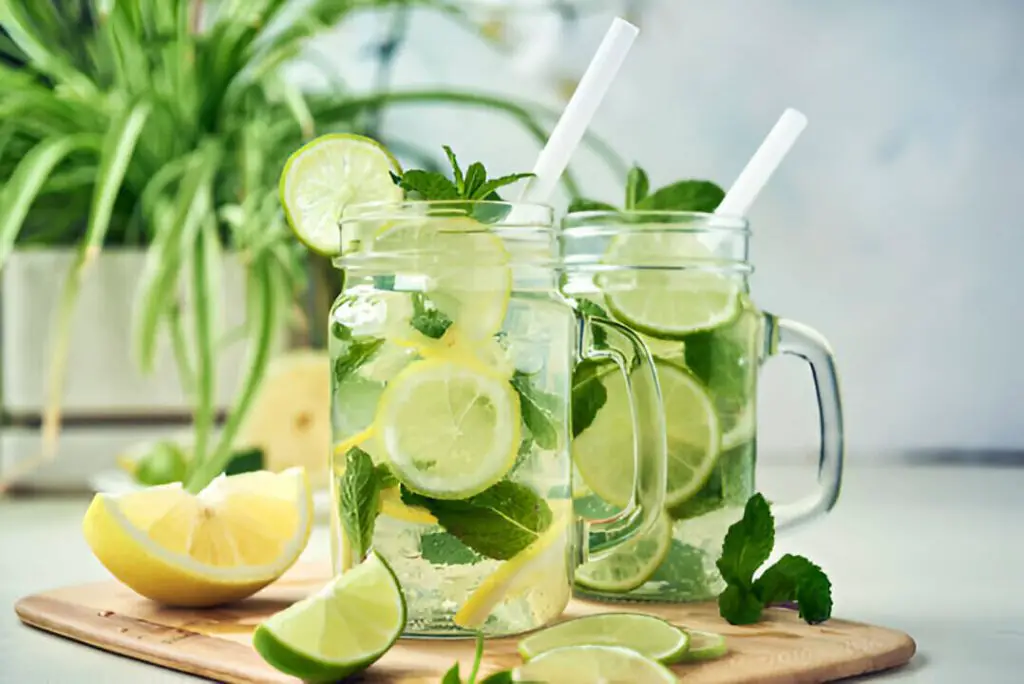Does lemonade go bad? Lemonade has a special place in our hearts (and taste buds) during the hot summer months. That tart, refreshing, and sweet drink is like liquid gold when you’re craving something cool and thirst-quenching. But have you ever wondered just how long that pitcher of lemonade can hang out before it turns into something… not so tasty?
The myth that lemonade is spoil-proof is a persistent one. After all, it’s loaded with acidity from all those lemon juices, and everyone knows acid is kryptonite for bacteria and other nasties that cause food to go bad. Surely lemonade gets some kind of superhero powers against rot and decay from all that citrus, right?
Not so fast. While lemonade may seem lemon-fresh forever, the sad reality is that improperly stored lemonade can degrade faster than you’d expect. Underneath that bright, zippy exterior lies the perfect environment for bacterial growth, if you’re not careful.
Whether it’s a perfectly balanced homemade lemonade or a convenient store-bought bottle, don’t take that summer staple for granted. Reducing lemonade waste starts with understanding the storage dos and don’ts to keep it tasting sublimely sour rather than disgustingly skunky.
Self-Sustaining Lemonade – Myth or Fact?
No one truly knows how the myth of lemonade’s longevity came about, but one can assume that the reason why people believe it to be rot-resisting is because of its acidic content and bacteria-fighting capabilities. After all, you’ll usually find lemon as a key ingredient in many anti-bacterial products, such as soaps and dishwashing liquids.
But the truth is, despite the lemon juice’s low pH, lemonade contains a dangerous mix of all the things that bacteria love: sugar and moisture. When you factor in a cozy, room temperature environment, you’re looking at a ticking time bomb that’s just waiting to go bad!
It’s understandable why the acidic properties of lemon juice might trick people into thinking lemonade can bypass normal spoilage. Bacteria can’t thrive in highly acidic environments, which is why high-acid foods like pickles and some aged cheeses can survive at room temperature without refrigeration. But two other critical factors go unnoticed in this equation: water and air exposure.
You see, even if you have a highly acidic food like lemons, it will simply bow down to the basic laws of chemistry and biology in the long run. The first culprit is air. Air causes oxidative stress on organic material, whether it’s fruit, meat, or even you. Given enough time, oxygen, along with other naturally present agents, will gradually cause organic material to lose its original qualities and break down.
In the case of lemonade, even when you store the beverage in the fridge, it will likely lose its vibrant flavor and quality over time, especially if you leave it in an open glass or pitcher exposed to air. The oxygen inevitably starts to degrade those delicious lemon notes.
The second factor working against your lemonade is temperature and moisture levels. Bacteria absolutely love a humid, warm environment, and no matter how acidic a food is, these microscopic organisms will easily compromise the surface before making their way inside, given the right conditions.
This is precisely why health authorities recommend not leaving lemonade (or any perishable beverage) sitting out at room temperature for more than 2 hours. Beyond that window, bacteria can start multiplying at an alarming rate in that sugary, moist lemonade base, despite the acidity of the lemons.
Does lemonade go bad?

Yes, lemonade can and does go bad relatively quickly if not stored properly.
Despite the acidic nature of lemon juice, lemonade itself provides an ideal environment for bacterial growth and spoilage due to its combination of water, sugar, and a lack of preservatives.
What causes lemonade to go bad?
The key factors that lead to lemonade degrading and going bad are air exposure, temperature abuse, and the fundamental nature of its ingredients.
Air/Oxidation
One of the biggest enemies of any fresh food or beverage is oxidation from air exposure. As soon as you mix up a batch of lemonade, a ticking clock starts as oxygen slowly starts breaking down the drink’s vibrant flavors, aromas, and quality over time.
Lemonade contains numerous compounds that are vulnerable to oxidation, including vitamin C, antioxidants, and volatile aroma compounds from the juice. As these delicate compounds are exposed to air, they begin degrading, which causes the brightness and potency of your lemonade to fade.
This is why commercially bottled lemonades undergo a rigorous process to remove as much oxygen as possible before sealing. Without taking those measures, the product would rapidly lose its fresh lemon taste soon after packaging. Even just leaving your pitcher of homemade lemonade uncovered allows air to continuously circulate and degrade the beverage.
Temperature and Moisture
In addition to air, the other factors expediting lemonade’s demise are overly warm temperatures and moisture levels that microbes love. Lemonade is essentially a sugar water solution with the perfect balance of nutrients and liquid environment for microbial proliferation when time and temperature allow it.
While lemon’s acidity can inhibit some microbial growth, it does not actually prevent or kill all potential pathogens outright, especially not indefinitely. Most of the yeasts, molds, and bacteria that can cause spoilage do just fine in lemonade’s typically low 2–3 pH range if allowed to multiply.
The danger zone for lemonade starts once it rises above refrigeration temperatures of 40°F and into the 50–70°F range. These cooler room temperatures may not seem that warm, but they provide enough ambient warmth for spoilage microbes to start slowly replicating in the sugary moisture bath.
Once lemonade hits temperatures above 70°F, particularly if left out for several hours, exponential microbial growth can occur. With both easily metabolized sugars and moisture available, those dormant microbes start rapidly multiplying and producing acids or gases that lead to quality degradation and spoilage.
This explains why health authorities recommend refrigerating lemonade and never leaving it out at room temperature for more than 2 hours. It only takes a brief window In those prime microbial temperatures before spoilage sets in.
Even a properly refrigerated container of lemonade is still vulnerable to slow, eventual spoilage once opened and exposed to air and microbes. Refrigeration simply delays the inevitable microbial party by keeping those guests in a hibernation state, rather than eliminating them.
So while the juice from lemons provides a tangy, acidic base that has antimicrobial properties, the final lemonade product is far from a rot-proof beverage. It contains the trifecta of characteristics that spoilage microbes love: easily digestible sugars, moisture, and the absence of preservatives to limit their growth.
At room temperature with ample air exposure, an improperly stored lemonade can spoil exceptionally quickly due to its nurturing environment for microbial proliferation. Proper chilling and sealing are essential for maximizing its freshness window before succumbing to the inevitable forces of air, warmth, and microbial spoilage over time.
How to Store Lemonade
Storing lemonade is actually very easy and straightforward; you just need to follow some basic best practices to keep it fresh and flavorful for up to a week.
Before we get into the specifics, it’s important to understand the difference between homemade and commercially-produced lemonade. Most homemade lemonades are made from 100% natural ingredients like fresh lemon juice, water, and sugar. This means they lack any preservatives and are more perishable compared to store-bought varieties.
Commercial lemonades, on the other hand, often contain added preservatives, stabilizers, and acidulants that give them an extended shelf life before opening. An unopened bottle of commercial lemonade can remain shelf-stable up to the “Best By” date printed on the label when stored properly. Some types may even be able to withstand short periods of room temperature with minimal quality loss.
However, once opened, both homemade and commercial lemonades require refrigeration to stay fresh. Here are the top tips for making your lemonade last:
Airtight Containers and Refrigeration
Your first line of defense is using an airtight bottle or pitcher and keeping the lemonade chilled. If you have leftover lemonade from a fresh batch, transfer it to an airtight container right away rather than leaving it out on the counter.
Storing lemonade in an airtight bottle or pitcher serves two purposes: it prevents air exposure to slow down oxidation, and it locks in freshness, aroma, and flavor. Leaving lemonade in an open container exposes it to air, which causes it to flatten and degrade much faster.
Once secured in an airtight container, refrigerate that lemonade immediately. Aim to keep it as cold as possible, around 40°F or lower. Colder temperatures significantly delay bacterial growth and spoilage.
When stored this way, homemade lemonade typically keeps for 3–4 days, while commercial lemonade can last up to a week in the fridge thanks to those preservatives. You can sometimes push the limits a bit longer if needed, but the quality will slowly diminish over time from oxidation and off-flavors.
Avoid sun Exposure

The refrigerator is your lemonade’s happy place, somewhere cold and dark away from direct sunlight. You may not realize it, but sunlight exposure can actually accelerate spoilage and chemical changes in food and beverages.
The effects of light aren’t just about heat; UV radiation from sunlight can damage and degrade compounds like vitamins and pigments. This disrupts color, aroma, and nutritional value, even if the item is chilled.
To get maximum shelf life out of your lemonade, always store unopened and leftover bottles in a dark, cool place away from bright light. Keep them towards the back of the fridge if possible, where no sunlight can penetrate.
Freezing for Long-Term Storage
If you need to keep lemonade for longer than a week, your best bet is to freeze it. The good news is that lemonade’s primary ingredients—water, lemon juice, and suga—freeze remarkably well with little quality loss.
To freeze lemonade, transfer it into a freezer-safe, airtight plastic bottle or container. Be sure to leave some headspace at the top, as the liquid will expand slightly as it freezes. Tightly seal the lid to prevent air exposure and freeze at 0°F or lower.
For best results, freeze lemonade in an upright position towards the back of the freezer, where temperatures are most constant. Properly frozen, homemade lemonade will keep for 2-3 months, while store-bought can last up to 6 months.
When you’re ready to defrost, transfer the frozen lemonade to the refrigerator and let it thaw overnight. If you need to speed up the process, you can run the container under lukewarm water, but never leave frozen items to quick-thaw at room temperature.
Signs of Spoiled Lemonade
Even when following best practices for storage, lemonade can eventually turn and become unsafe to drink. Catching it early is key to avoiding a nasty bout of food poisoning. Fortunately, there are some clear signs you can look for to determine if your lemonade has spoiled.
One of the biggest giveaways that lemonade has started going bad is? Changes in color and texture. Fresh lemonade should maintain a vibrant, consistent yellow or yellow-orange hue with a smooth, even texture when given a gentle swirl or tilt of the container.
If you notice the lemonade taking on a dull, murky, or inconsistent color, that’s one of the first signs of spoilage. You may also see visible growths forming—anything from scattered speckles to big furry clumps is cause for immediate disposal. Mold, fungi, and bacteria will start altering the appearance.
When in doubt, pour a small amount into a clear glass to get a better look, as opaque containers can camouflage what’s going on inside. A spoiled lemonade will often look thicker and cloudier with “stuff” floating in it or sedimented at the bottom.
Another big red flag is if you detect any “off” or unpleasant aromas emanating from the container. While fresh lemonade should simply smell bright and lemony, spoiled lemonade takes on a distinctly funky, almost rotten or sour odor as byproducts from microbial spoilage accumulate.
If your lemonade has developed an odd aroma compared to when it was fresh, it’s best to err on the side of caution. That sour smell usually indicates the start of lactic acid fermentation from proliferating bacteria—not something you want to ingest!
The sniff test may seem obvious, but don’t rely on smell alone. For a more definitive verdict, you’ll need to take a small taste test as well. Before sipping, give the lemonade a gentle swirl to release any aroma. Then take a small sip and consider the flavor carefully.
A lemonade that has just started going off may simply taste “flat” or slightly less bright than when fresh. This dip in potency is normal as acids degrade and aromas oxidize over time. However, if you detect any decidedly sour, bitter, or rotten off-flavors, that’s a sure sign it’s no longer safe to drink.
If your sample tastes anything less than refreshingly tart and lemony, spit it out immediately, rinse your mouth, and discard the entire container of spoiled lemonade. It’s simply not worth risking potential food-borne illnesses like nausea, vomiting, diarrhea, and abdominal pain.
FAQs
Can You Drink Lemonade Past the Best-By Date?
Most commercially bottled lemonades will have either a “Best-By” date or an expiration date printed on the packaging. The best-by date indicates how long an unopened product will maintain peak quality when stored according to the manufacturer’s recommendations.
As long as the bottle remains commercially sealed and has been continuously refrigerated or frozen, you can generally drink lemonade a few days past that best-by date with minimal risk. The flavor may fall a bit flat, but it should still be safe to consume within a short window.
However, bottles stamped with an expiration date should always be discarded after that date, regardless of how the lemonade looks or smells. Expiration dates take into account potential microbial growth over time, even in properly refrigerated conditions. Never take a risk by drinking expired lemonade.
Can lemon juice concentrate go bad?
While highly acidic lemon juice has a longer shelf life than lemonade, even lemon juice concentrate can spoil if not stored properly. Commercially bottled lemon juice is treated to remove bacteria and make it shelf-stable, but it’s not impervious to spoilage.
An unopened bottle of lemon juice can typically last 6–12 months past its stamped date if continuously refrigerated after opening. However, once that seal is cracked, it should be consumed within 5-7 days max, even refrigerated. And once diluted with water into lemonade form, the standard perishable rules apply.
For best quality and safety, always refrigerate any open lemon juice products promptly. Look for signs of mold, discoloration, cloudiness, or an off-smell that indicates it’s spoiled. While very acidic, lemon juice can still breed harmful bacteria, given the right conditions.
Can you freeze lemonade in plastic containers?
Yes, you can freeze lemonade in plastic containers and bottles as long as they are intended for freezer use. Standard plastic containers may appear solid, but can easily crack or become brittle from temperature fluctuations in the freezer.
Only use containers labeled as freezer-safe or meant for food storage below 0°F. Fill them up with headspace for expansion, seal tightly to prevent freezer burn, and use within the recommended timeframe of 2–6 nths.
While freezing lemonade does significantly extend its shelf life, the frozen product can still slowly degrade in quality over time. You may notice some separation, cloudiness, or subtle flavor changes after being frozen for multiple months.
When should you toss moldy lemonade?
If you encounter even a tiny bit of mold growth in your lemonade container, the entire batch should be disposed of immediately with no second thought. Molds can produce dangerous mycotoxins that cause illness.
Do not try scooping out the visible mold, as microscopic airborne spores and roots can permeate through the entire batch, even parts that appear clean. It’s simply not worth risking your health by trying to salvage a moldy jug of lemonade.
A good rule of thumb is that if you can see any mold growth, toss it without hesitation and thoroughly disinfect any surface it touches to prevent cross-contamination. When it comes to moldy foods, it’s always better to be safe than sorry!
Can drinking spoiled lemonade make you sick?
Yes, consuming lemonade that has spoiled and contains bacteria growth can potentially cause food poisoning and illnesses like nausea, vomiting, diarrhea, and abdominal cramps. It’s best to discard any lemonade that smells off, is discolored, or tastes sour/rotten.
How can you tell if the powdered lemonade mix has gone bad?
Powdered lemonade mixes have a much longer shelf life than fresh lemonade, but they can still go stale or pick up off-flavors over time. Look for changes in color, clumping, or a stale smell as signs the powder may have gone bad. Properly stored, powders are typically good for 6–12 months past the best-by date.
Is it safe to drink lemonade that was left out overnight?
No, it’s not recommended to drink lemonade that was left out at room temperature for more than 2 hours. Bacteria can start rapidly multiplying in that sugary liquid environment once it’s out of refrigeration for extended periods. Discard any lemonade sitting out overnight to be safe.
Can you get sick from drinking expired bottled lemonade?
Possibly, it depends on how long past the expiration date it is. Drinking commercially bottled lemonade within a week of its expiration may cause no ill effects, but the older it gets, the higher the risk of bacteria growth that could make you sick. It’s best to discard bottled lemonades once they reach expiration.
Will boiling spoiled lemonade make it safe to drink again?
No, boiling or cooking spoiled lemonade after it has gone bad will not make it safe for consumption. Some bacteria produce heat-stable toxins that boiling can’t destroy. The only safe option is to discard any lemonade that shows obvious signs of spoilage.
How long does freshly squeezed lemon juice last?
Fresh squeezed lemon juice that has not been preserved will last 2–3 days refrigerated in an airtight container. However, once mixed with water and sugar to make lemonade, it has a much shorter lifespan of just 3–4 days refrigerated before spoiling.



